Open source sensor controller device shrinks
Jun 2, 2008 — by Eric Brown — from the LinuxDevices Archive — 4 views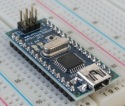 The Arduino Project has announced a new compact version of its open source Arduino microcontroller platform called the Arduino Nano. Meanwhile, winners of the Arduino Open Hardware Contest have been announced, and include a security system, a modular robot, and a sweater-clad haptic navigational device.
The Arduino Project has announced a new compact version of its open source Arduino microcontroller platform called the Arduino Nano. Meanwhile, winners of the Arduino Open Hardware Contest have been announced, and include a security system, a modular robot, and a sweater-clad haptic navigational device.
The Arduino Project intends its Arduino boards and open source hardware designs to be used by hobbyists, artists, designers, and others. The boards can be used to prototype I/O platforms or create “interactive objects or environments,” the group says.

Arduino's original Diecimila board
The original Arduino Diecimila is built around Atmel's AVR microcontrollers, either the ATmega8 or the ATmega168. It offers 11 digital and six analog inputs that support a wide variety of sensors, including GPS, temperature, humidity, light, presence, and pressure. The Arduino board responds to the sensors and can control lights, motors, and other actuators.
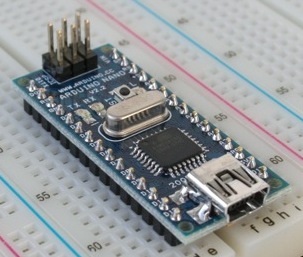
Arduino's new Nano board
The new, smaller Arduino Nano offers the same functionality as the Arduino Diecimila, says the Arduino Project, but is available in a “breadboard-ready” design that measures only 0.73 x 1.70 inches. The Nano was designed and manufactured by US-based Gravitech.
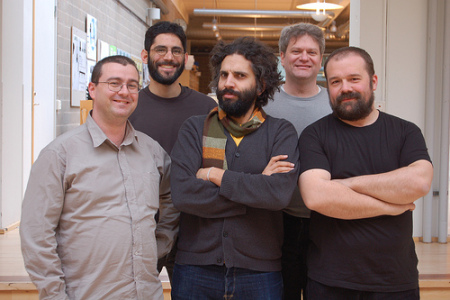
The Arduino Project team (back) Dave Mellis, Tom Igoe;
(front) Gianluca Martino, David Cuartielles, Massimo Banzi
The Nano is equipped with an ATmega168 microcontroller clocked at 16MHz. It has 16KB of flash and 1KB of RAM. I/O includes a USB port with Mini-B jack, and a set of 14 digital I/O pins and eight analog inputs. There is also an ICSP programming header and an on-board regulator. The Arduino Nano accepts power from its mini-B USB connection, from an unregulated 6-20V external source, or from a regulated external 5V source.
Arduino offers a completely open source electronics prototyping platform for Arduino. It is based on “Wiring” and “Processing” environments, and is claimed capable of interacting with software such as Flash, Processing, or MaxMSP.
Open Hardware Contest
 Libelium's Arduino-based SquidBee mote sensor |
Libelium, a company in Zaragoza, Spain, organized Arduino's Open Hardware Contest. Libelium has used Arduino in two product designs, including its ZigBee-based SquidBee “mote” sensor (pictured at right), and a SquidBee-compatible x86-based multi-protocol mesh router called the Meshlium with a Debian GNU/Linux-based OS.
The results of the open hardware contest have been published on Libelium's website, complete with videos, photos, code, and descriptions. Winners and runners-up include
- Life Hacks Winner: Arduino Security — Javier Briz and Valentin Plugaru — Keypad-controlled door lock equipped with servo motor, sliding lock, and numeric keyboard, with Arduino responding to door-lock sensors to issue different sounds based on status of lock.
- Life Hacks Finalist: Arduino Weather Forecaster — Alex Bell
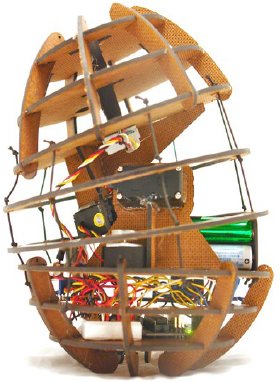
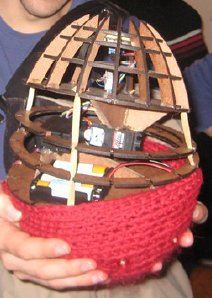
Two views of the Momo - Art Hacks Winner: Momo — Kristin O'Field and Che-Wei Wang — Momo (see image above) is a haptic navigational device that combines a GPS unit, a compass, and two servo motors to guide users toward a destination by sense of touch. Like a dog who knows his way home, the Momo continues to point toward its GPS destination via the compass, shifting the top part of the flexible structure to indicate direction.
- Art Hacks Finalist: Sensor Squid Force — Rebecca Stern

R4P robot - Robotics Hacks Winner: R4P — Luis Ignacio Diaz del Dedo and Luis Alberto Perez Garcia — R4P (see image above) is a quadrupedal, modular robotics platform designed to act as an autonomous intelligent agent that can react to external stimuli. The robot is said to offer either “punctual or multiple support legs,” and incorporates Bluetooth, servo motors, distance sensors, inclinometers, and a digital compass.
- Robotics Hack Finalist — Walbot — Brandon Sweeny
The Arduino Nano is available for pre-order from Gravitech for a pre-shipment sale price of $45 (regularly $50), and will ship on June 16th. More information and an ordering form is available from this Gravitech page, and more on Arduino in general is available on this Arduino page. The results of Libelium's Arduino Open Hardware Contest should be available here.
This article was originally published on LinuxDevices.com and has been donated to the open source community by QuinStreet Inc. Please visit LinuxToday.com for up-to-date news and articles about Linux and open source.